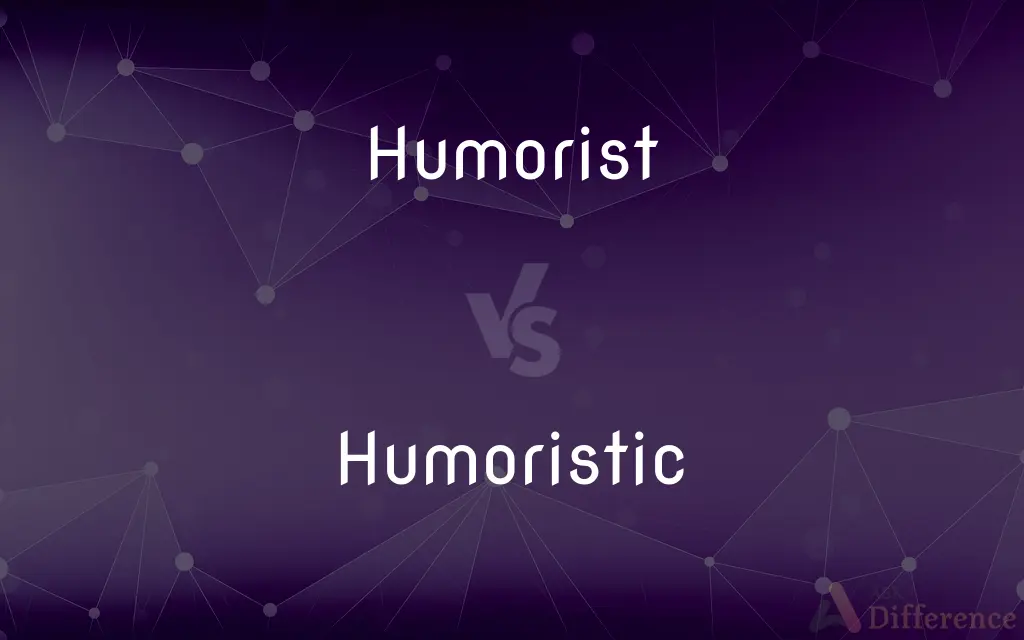Humorist vs. Humoristic — What's the Difference?
Edited by Tayyaba Rehman — By Fiza Rafique — Updated on April 9, 2024
A humorist is someone who specializes in creating humor, while humoristic pertains to the quality or characteristic of being humorous or related to humor.

Difference Between Humorist and Humoristic
Table of Contents
ADVERTISEMENT
Key Differences
A humorist is a person, such as a writer, comedian, or actor, who creates and delivers humor through various forms of media, aiming to entertain and often enlighten an audience by highlighting the irony or absurdity of life's situations. On the other hand, humoristic is an adjective that describes anything related to humor or having a humorous quality. It can apply to works of art, literature, commentary, or any expression intended to evoke laughter or amusement.
While the role of a humorist is active, involving the creation and performance of humor, the term humoristic is passive, used to describe the nature or characteristic of a piece of work or an observation. A humorist directly engages with an audience, using wit, satire, or comedy, whereas something humoristic may not involve direct interaction but possesses qualities that provoke amusement.
Humorists often use their personal insights, observations of societal norms, and interactions with the world to craft their humor, making their work inherently reflective of human nature and societal quirks. Humoristic works, however, can range widely, from light-hearted and whimsical to darkly satirical, encompassing any material designed to be funny or entertaining.
The effectiveness of a humorist lies in their ability to connect with their audience, using humor as a tool for reflection, critique, or simply entertainment. In contrast, the appeal of humoristic content depends on the audience's personal tastes, cultural background, and the context in which it is presented or consumed. A humorist's craft is dynamic, evolving with societal changes and personal growth, while humoristic qualities in work remain static, defined at the point of creation.
Humorists are celebrated for their unique voices and perspectives, often gaining a following for their distinctive style of humor. Humoristic elements in media or literature, however, contribute to the broader appeal of the work, complementing themes, characters, and narratives to enhance enjoyment and engagement.
ADVERTISEMENT
Comparison Chart
Definition
A creator of humor
Pertaining to humor
Nature
Personal and interactive
Descriptive and characteristic
Role
Active in producing humor
Passive quality of work
Impact
Direct engagement with audience
Indirect, depends on reception
Variation
Style evolves over time
Fixed at creation
Example
Comedians, writers, actors
Humorous books, shows, articles
Compare with Definitions
Humorist
A person who produces humor in writing, speech, or performance.
Mark Twain was a renowned humorist known for his wit.
Humoristic
Pertaining to the quality of being funny or comical.
His humoristic approach to serious topics made them more approachable.
Humorist
A comedian or writer specializing in creating funny content.
The humorist entertained the crowd with stories of everyday absurdities.
Humoristic
Relating to the creation or appreciation of humor.
The lecture included a humoristic analysis of political cartoons.
Humorist
An entertainer whose craft involves making people laugh.
The dinner party was livened up by a visiting humorist.
Humoristic
Characterized by or involving humor.
The play's humoristic tone kept the audience laughing.
Humorist
A creator whose work focuses on eliciting amusement.
The humorist's latest book captures the comedy of social faux pas.
Humoristic
Describing an artifact or expression designed to amuse.
The museum's humoristic exhibit on vintage cartoons was a hit.
Humorist
Someone adept at seeing and expressing the humor in life's situations.
As a humorist, she could make even mundane events seem hilarious.
Humoristic
Indicative of a tendency to use humor in expression or interpretation.
Her humoristic writing style has earned her many fans.
Humorist
A humorist (American) or humourist (British spelling) is an intellectual who uses humor, or wit in writing or public speaking, but is not an artist who seeks only to elicit laughs. Humorists are distinct from comedians, who are show business entertainers whose business is to make an audience laugh.
Humoristic
Pertaining to a humorist or his or her style.
Humorist
A person with a good sense of humor.
Humoristic
Of, pertaining to, or resembling, a humorist.
Humorist
A performer or writer of humorous material.
Humorist
Someone who believes that health and temperament are determined by bodily humours; a humoralist.
Humorist
(obsolete) Someone subject to whims or fancies; an eccentric.
Humorist
A humorous or witty person, especially someone skilled in humorous writing or performance.
Humorist
One who studies or portrays the humours of people.
Humorist
One who attributes diseases of the state of the humors.
Humorist
One who has some peculiarity or eccentricity of character, which he indulges in odd or whimsical ways.
He [Roger de Coverley] . . . was a great humorist in all parts of his life.
Humorist
One who displays humor in speaking or writing; one who has a facetious fancy or genius; a wag; a droll; especially, one who writes or tells jokes as a profession.
The reputation of wits and humorists.
Humorist
Someone who acts speaks or writes in an amusing way
Common Curiosities
What makes someone a humorist?
A humorist is someone skilled at creating and conveying humor through various mediums, often reflecting on society or human nature with wit or satire.
Can any form of art be considered humoristic?
Yes, any form of art that incorporates elements of humor or is designed to evoke laughter can be described as humoristic.
Can humoristic work be serious?
Yes, humoristic work can address serious topics with a light-hearted or satirical approach, often making complex ideas more accessible.
Is being a humorist a profession?
For many, being a humorist is a professional career, encompassing roles like comedy writing, stand-up comedy, and humorous literature.
How do you recognize humoristic content?
Humoristic content is recognized by its intent to amuse, provoke laughter, or provide a light-hearted take on various subjects.
Can a humorist's work become less humoristic over time?
While the work itself doesn't change, public perceptions of humor can evolve, possibly making a humorist's work seem less humorous to future audiences.
What's the difference between a comedian and a humorist?
While both may create humor, a humorist often has a broader scope, possibly including writing and other forms of creative expression, whereas a comedian typically focuses on stand-up comedy and performance.
Is there a universal standard for what is considered humoristic?
No, what is considered humoristic varies widely across different cultures, communities, and individuals, influenced by social norms and personal taste.
How does cultural context affect humoristic content?
Cultural context significantly influences what is considered humorous, as humor often relies on shared experiences, beliefs, and values.
Can a work be humoristic without a humorist?
Yes, works can be humoristic based on content and style, even if not created by someone primarily identified as a humorist.
Share Your Discovery

Previous Comparison
Reroute vs. Detour
Next Comparison
Electrode vs. AnodeAuthor Spotlight
Written by
Fiza RafiqueFiza Rafique is a skilled content writer at AskDifference.com, where she meticulously refines and enhances written pieces. Drawing from her vast editorial expertise, Fiza ensures clarity, accuracy, and precision in every article. Passionate about language, she continually seeks to elevate the quality of content for readers worldwide.
Edited by
Tayyaba RehmanTayyaba Rehman is a distinguished writer, currently serving as a primary contributor to askdifference.com. As a researcher in semantics and etymology, Tayyaba's passion for the complexity of languages and their distinctions has found a perfect home on the platform. Tayyaba delves into the intricacies of language, distinguishing between commonly confused words and phrases, thereby providing clarity for readers worldwide.
















































